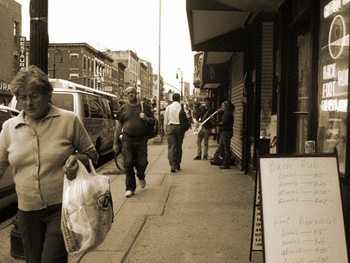
First of all, let me give a special thank you to my fellow contributors at Star Maker Machine, for their help gathering songs for this post. And let me say that I have left plenty of street songs for a possible future theme there, if anyone is interested.
It’s not hard to find songs whose titles are street names. But it is rare to find that the song is literally about the place. Rather, street names represent, in the minds of the songwriters, a state of mind associated with a place. The most successful of these songs imprint these associations into the minds of the listeners. The better known the song, the harder it becomes to ever see that street name again without making the same connection the songwriter did.
Richard Shindell: Mercy Street
[purchase]
Mercy Street is entirely a state of mind. The song was inspired by the author Anne Sexton. Sexton was a mental patient who suffered from severe depression. She took to writing as a form of therapy, creating poems, and eventually a play, 45 Mercy Street. This therapy created some enduring art, but did not save Sexton’s life. She committed suicide in 1974. The darkness in the song represents her depression.
I could have posted Peter Gabriel’s original version of the song. It is certainly worthy. But Richard Shindell is a musician who always finds his way to the emotional heart of a song, whether it be his own or a cover. I chose his version because I want more people to know about his work. 
Nellie McKay: Manhattan Avenue
[purchase]
Manhattan Avenue is a beautiful jazz ballad. The music leads you to expect a sumptuous love story. But Nellie McKay uses this musical setting to depict an impoverished street, inhabited by both muggers and children. Despite the starkness of the setting, dreams also live here.
Gerry Rafferty: Baker Street
[purchase]
Baker Street addresses a character who came to the city seeking excitement, and found loneliness and alienation. After eloquently describing his state of mind, Gerry Rafferty gives him a way out. He can return to the town he came from.
My long time readers may be surprised to see this song here. The basic four piece rock band is augmented by horns and a large string section. There is extra percussion. This is the type of 70s production that I often rail against. But here, all of the elements of the arrangement make sense. The lushness of the arrangement, compared to the content of the lyrics, forms a nice irony. This is a 70s production that works. And that is why this song never sounds dated, when so many others do.
The Beatles: Penny Lane
[purchase]
Gerry Rafferty’s character dreams of a place like Penny Lane. Here every street corner is home to a friend. The warmth of an actual nighborhood has never been described better.
Penny Lane is also a fine early example of The Beatles and producer George Martin’s mastery of the recording studio. It is difficult to appreciate now just how innovative the production on this was.
XTC: Respectable Street
[purchase]
XTC provides a depiction of the dark side of small town life. Here, familiarity breeds contempt. Everyone knows, and judges, everyone. And these judgments include observations of all manner of hypocrisy.
I have always said that what kills a punk band is that they learn to play their instruments. That happened very quickly to XTC. Respectable Street retains the raw energy of punk, but adds a crispness in the guitar parts, and a rhythmic sophistication that is almost funk. The vocals, similarly, retain the strong emotion of XTC’s punk roots, but are sung rather than shouted.






0 comments:
Post a Comment